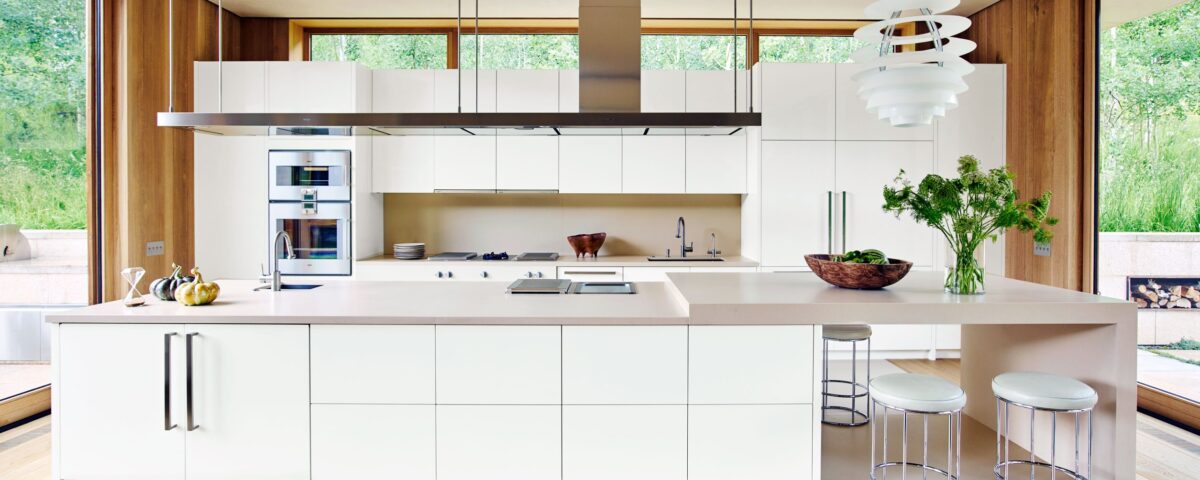The variety of natural stone options can be perplexing, especially as each one has its ideal application but also overlaps suitable applications with other stones.
When choosing how to outfit a design with stone, it is important to keep several properties of your natural stone options in mind, including hardness, resistance to scratching, reaction to acids, porosity, and ability to withstand high traffic.
Each stone is ideally suited for certain applications, and less appropriate for others. Here are some recommendations for how to use the different types of natural stones that we offer.
Granite
The go-to for beautiful, durable natural stone, Granite can withstand water, mild abrasions, and heavy traffic, with little wear or need for maintenance, making it perfect for nearly all applications. Granite is ideal for kitchens, because it is less easily damaged by heat, knives, or water than other natural stones. Flooring, shower surrounds, and fireplace surrounds are perfect applications for Granite, as well, because its durability can stand up to regular heat, water, and weight. Consider your climate before installing Granite outdoors. Areas where there are regular freeze/thaw patterns can be hard on the stone, and prolonged direct sunlight can make the surface very hot.
White Granite Kitchen Countertop in Residential Home
Marble
Marble exudes elegance and sophistication, but is softer and requires more diligent care than some other natural stones. Interior accents, like tabletops, staircase handrails, and bathroom vanities, are all perfect for showcasing the luxury of marble without exposing it to excessive heat or traffic. Along walls and chair rails, Marble can bring a beautiful accent to a space as well. In the kitchen, Marble backsplashes bring classic grandeur to the room, without being subject to the traffic that a countertop must withstand. Marble is also a perfect stone for accent furniture, including the tops to side tables or buffet bars that bring aesthetic value to a room, but may not be as heavily used.
Green Marble Island in Residential Kitchen
Travertine
Formed in hot springs and limestone caves, Travertine’s textured and fibrous appearance wraps its surroundings in natural warmth and energy. Since Travertine is easy to cut, it is often used in tile form, making it ideal for backsplashes and flooring, especially when you have to fill a small or oddly-shaped space. Since it can be porous and is highly reactive to acidic substances, Travertine is better used in areas where it will not be exposed to any spills, such as water, vinegar, fruit juices, or liquids that are likely to stain (coffee, wine, soy sauce, etc). Fireplaces, flooring, and wall cladding are popular applications for this warm and alluring natural stone.
Travertine Tiles in Lounge on Wall and Floor
Onyx
Onyx is becoming more trendy for those looking for a stunning, rare luxury for their homes and businesses. This translucent stone is perfect for any areas that will be illuminated with backlighting, because Onyx catches the light in an extraordinary way. Since Onyx can be easily scratched or marred by acids, harsh cleansers or knives, it is best used to make a beautiful aesthetic statement in a space that does not experience heavy use. Bar tops, like reception desks and display shelves would be perfect opportunities to showcase Onyx’s unique glow.
Limestone
Often considered the mother stone of Marble, Travertine and Onyx, Limestone’s presence throughout history makes it the quintessential choice for modern day homes and businesses seeking old world charm. Since it is often very dense and durable, Limestone is perfect for flooring, countertops, and wall cladding for interior and exterior surfaces.
Limestone Island in a Residential Kitchen
Soapstone
Soapstone’s flat, warm beauty offers a softer and more rustic aesthetic than gleaming Marble or Granite. Since its finish is honed or leathered, rather than polished, the surface of Soapstone is more forgiving of scratches than polished stones. Due to its acid resistance, Soapstone is a popular choice for kitchens or bar tops, where it is likely to come into contact with fruit juice or vinegars (such as cocktail garnishes). Similarly, Soapstone is extremely heat-retentive and able to both withstand and radiate warmth, making this stone ideal for fireplace surrounds.
Soapstone Kitchen Countertops in a Residential Kitchen










